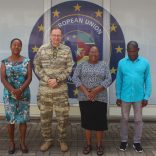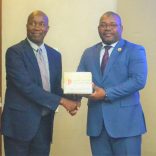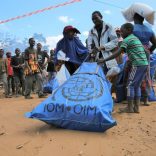Mozambique: EUMAM MOZ and FADM Gender Advisors strengthen the dialogue
Mozambique: Over 80,000 flee rebel attacks in Cabo Delgado this year – MSF

FILE - For illustration purposes only. [File photo: Lusa]
The non-governmental organisation (NGO) Médecins Sans Frontières (MSF) on Monday estimated that more than 80,000 people have fled terrorist attacks this year in Cabo Delgado, northern Mozambique, asking for food assistance and psychological support.
“Six years after the start of the violent conflict in the North of Mozambique, people in Cabo Delgado still live in fear. In 2024 alone, over 80,000 people had to flee following attacks by armed groups,” MSF said in a statement.
“The displaced families urgently need food, shelter, relief items, healthcare and mental healthcare,” says the organisation.
The text quotes an MSF psychologist, Esperança Chinhanga, in Macomia district, who says that “displaced people often have been highly traumatised by the violence “.
“Some people experience anxiety, panic attacks, insomnia, isolation and have recurrent thoughts,” said Chinhania.
“Some share they lost the meaning of life and mention suicide thoughts,” she described.
MSF recalls that since 2017, when armed attacks began in Cabo Delgado province, families have been displaced several times.
“Most have experienced or witnessed extreme violence, including killings, sexual violence, kidnappings, extortion, and villages being burnt,” the statement added.
Many had or saw their relatives and neighbours being assassinated, decapitated, or killed by gunfire. Some have lost their entire family, the statement said.
“The violence isn’t abating, and people have to flee repeatedly. As of January 2024, some 76,000 people living in Macomia, have been displaced over the past years. In February, some 3,600 people were newly displaced following multiple attacks in the district. Their stories are harrowing.” it emphasised.
A total of 72 children are missing following terrorist attacks in recent weeks in the Chiùre district of Cabo Delgado province in northern Mozambique, local authorities said today.
“Following the flight of the residents of Chiùre to Eráti, we have a total of 61 families who have reclaimed their children, 29 have been reintegrated and 72 remain missing,” said Albertina Ussene, the provincial director of Gender, Children and Social Action in Nampula, the province where the district of Eráti is located and which hosts the displaced from Chiùre.
After several months of relative normality in the districts affected by armed violence in Cabo Delgado, the province has been experiencing new movements and attacks by rebel groups for a few weeks now, which have limited circulation to a few points on the few tarmac roads that give access to various districts.
Official government figures indicate that the new wave of attacks in recent weeks has forced 67,321 people to flee their homelands, incursions justified by the Mozambican executive as the result of the “movement of small groups of terrorists” who have left their bases in the south of Cabo Delgado, after a period of relative stability.
Cabo Delgado province has been facing an armed insurgency for six years, with some attacks claimed by the extremist group Islamic State.
The insurgency has led to a military response since July 2021, with the support of Rwanda and the Southern African Development Community ( SADC), liberating districts near gas projects, but new waves of attacks have emerged in the south of the region.
The conflict has already displaced one million people, according to the United Nations High Commissioner for Refugees (UNHCR), and caused around 4,000 deaths, according to the Armed Conflict Location and Event Data Project (ACLED).
In 2024 alone, over 80,000 people had to flee following attacks by armed groups. The displaced families urgently need food, shelter, relief items, healthcare, and mental healthcare.
Read more: https://t.co/GmpLrL08R0
— Doctors Without Borders (MSF) Southern Africa (@MSF_southafrica) March 4, 2024












Leave a Reply
Be the First to Comment!
You must be logged in to post a comment.
You must be logged in to post a comment.